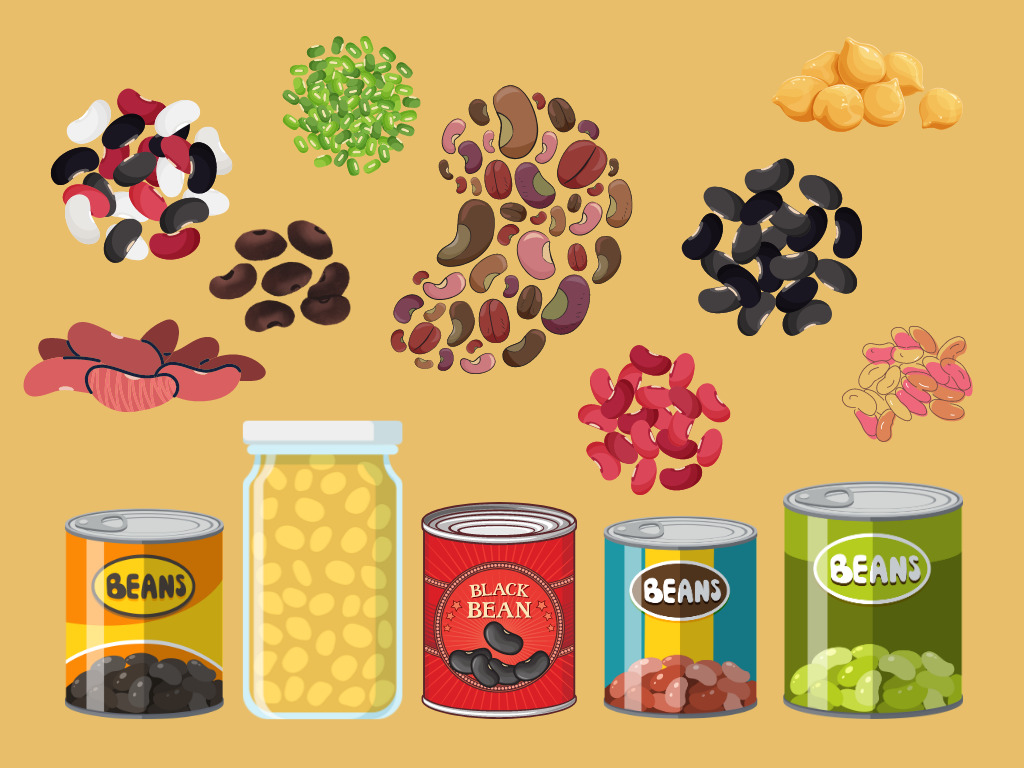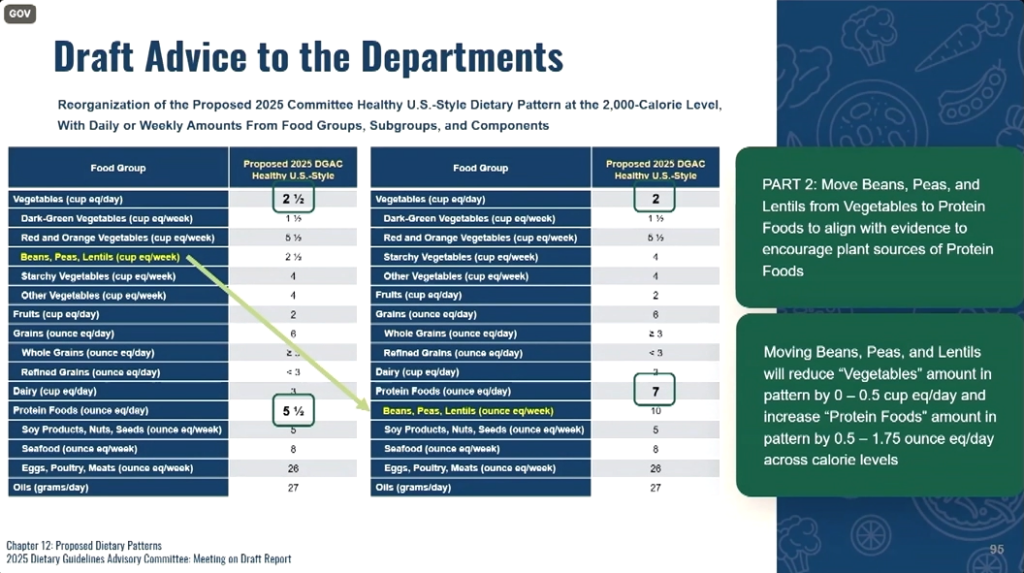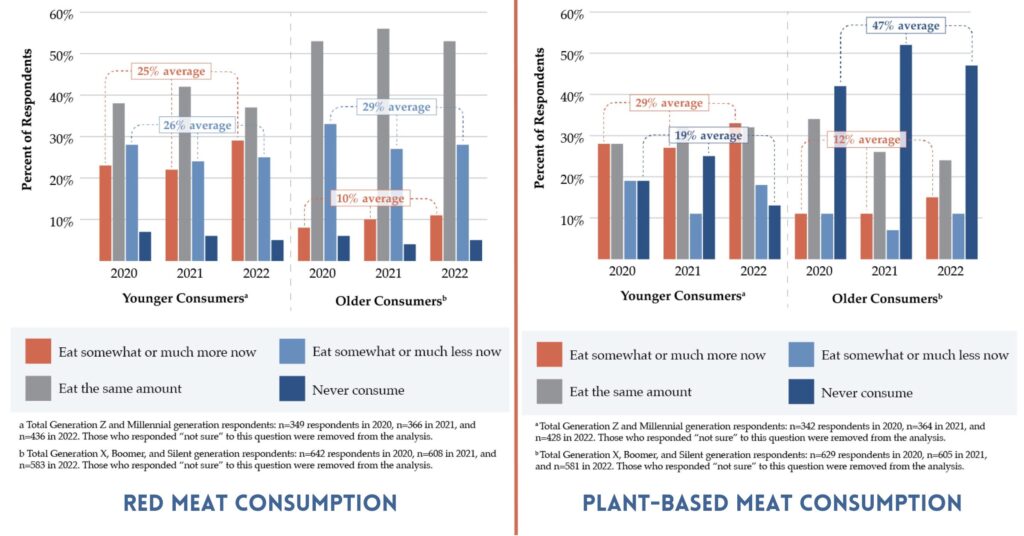
Americans should eat less red meat and more plant-based protein, according to scientists advising the US government on its upcoming update of dietary guidelines.
If you follow the EAT-Lancet Commission’s Planetary Health Diet, you’d know that you should limit your consumption of beef, pork and lamb to 11 lbs a year. If you can’t give up red meat, that’s the maximum amount it recommends you eat to protect the health of both yourself and the planet we live on.
But in the US, people consume 107 lbs of red meat every year, according to USDA projections, which is an amount nearly 10 times higher than Planetary Health Diet suggests.
This is a problem for several reasons. When it comes to pollution from food production, beef is as bad as it gets. There’s also not enough land or water to feed a global population that would be approaching 10 billion by 2050. And red meat, contrary to what many advocates claim, does more bad for you than good, with links to cardiovascular disease, obesity, type 2 diabetes, cancer, and other diseases.
It’s why the EAT-Lancet Commission is urging people to reduce red meat intake by 90% and follow a primarily plant-based diet. It’s also why more and more countries are adopting similar measures in their national dietary guidelines.
The US is hoping to do the same. Scientific experts drafting recommendations to the government for the next national dietary guidelines are calling for a shift away from red meat and a greater emphasis on plant proteins.
But this has already sparked furore from meat producers and meat-eating consumers, setting the stage for an intense tussle over the final guidelines, which are due to be unveiled late next year.
Draft US dietary guidelines promote plant proteins over meat

The US revises its dietary guidelines every five years, with the forthcoming update covering the 2025-30 period. While they don’t necessarily have a heavy influence on how individual Americans eat, they do have important implications for school lunches, the food companies make, and public health efforts.
So far, the guidelines have recommended limiting saturated fat – which is present in high volumes in steak, burgers and processed meat – but have kept away from the red meat debate.
That may be changing now. In the seventh and final meeting of the 20-person Dietary Guidelines Advisory Committee, experts have drafted recommendations to cut back on red and processed meat, both of which have been classed as carcinogenic by the World Health Organization.
The scientists are instead calling for a shift to a more plant-forward way of eating, as the Wall Street Journal reports, with an emphasis on vegetables, fruits, legumes, whole grains, nuts, fish and seafood, low- and non-fat dairy, and unsaturated fats.
The committee has also proposed changes to the protein food group in an effort to deprioritise meat. This would see peas, beans and lentils move from the vegetable to the protein category, and be listed above meat, poultry, eggs and seafood to “align with evidence to encourage plant sources of protein foods”. Soy products, nuts and seeds would also be listed above animal proteins.
The suggestions were supported by a majority of the experts, and nobody said the existing guidelines should be preserved. Angela Odoms-Young, vice-chair of the committee, also said beans, peas, and lentils should be a separate category, a proposal backed by several committee members.
“Behaviorally, I think there is sort of a branding crisis when it comes to protein – thinking automatically meat,” Deirdre Tobias, an assistant professor at Harvard University’s Department of Nutrition and a committee member, said during the meeting. “And if there are more plant sources of proteins in the protein category that could help overcome that, you know, mislabeling or misnomer or misinformation by having it more prominently.”
She added: “I also think that that’s where we would probably offer more flexibility – where we would have an increase in plant-based. That’s going to be increasing beans, peas, and lentils at the expense of some of those other meat products, right? Not so much to displace vegetables that are in the vegetable category.”
Recommendations met with backlash, but are much-needed

The draft recommendations were met with immediate and fierce backlash from members of the meat industry. Ethan Lane, VP of government affairs at the National Cattlemen’s Beef Association, called the committee meeting “one of the most out-of-touch, impractical, and elitist conversations in the history of this process”. “We would laugh at the suggestion that beans, peas, and lentils are going to replace lean red meat and fill all the nutrient gaps Americans are facing if it weren’t such a dangerous and deceptive idea,” he added.
And it’s not just industry stakeholders. Some Americans seem to be angry too. “They can have my red meat when they pry it from my cold dead fingers dripping in medium rare hamburger juice,” wrote one reader on the Wall Street Journal’s comments section.
“This ‘recommendation’ is coming from those who want to control you. Just one more facet in their plan. Control the food. Control the currency (digital). Control the news. We need to put a complete stop on ‘dietary recommendations’,” wrote another. “Cows are not destroying our environment – the mono-crops are. Wake up.”
The problem is, cows are most definitely destroying the environment. As mentioned above, beef is the most carbon-intensive food on the planet, and lamb and mutton aren’t too far behind. Within the US, too, red meat is responsible for a third of total greenhouse gas emissions from the food system.
But it’s no surprise that some people believe beef is not bad for the planet. Polling shows that 40% of Americans don’t think consuming less red meat would help lower emissions, while a separate survey found that 74% of Americans don’t link meat-eating with climate change. And a survey by Gallup has revealed that the number of vegans in the US has reached a 10-year-low.

Despite three-quarters of US consumers finding plant proteins healthy, compared to 39% who think the same for animal protein, the number of people who reported eating more red meat rose from 13% in 2020 to 19% in 2022. Likewise, fewer Americans are reducing their red meat intake too.
This may be because 59% of them believe eating meat is just part of “the American way of life”, according to a 2021 poll found. But experts have repeatedly implored the nation to cut back on these highly polluting foods. However, with just 12% of Americans responsible for half of the country’s meat consumption, certain groups – like men and those on the carnivore diet – would need to take much more drastic action than others.
The dietary guidelines committee has received nearly 10,000 comments during this process, the most it has ever been subject to. Its report still needs to be finalised before being sent to the US Department of Agriculture and Department of Health and Human Services, which is expected in December.
Following that, the public will have 60 days to submit comments, and the agencies will take everything into consideration and release the official guidelines by the end of 2025. It’s no guarantee that these proposals will be taken up by the government – in the 2020 edition, the committee recommended significant cuts to added sugar and alcohol limits, but the policymakers rejected these proposals.
But an endorsement of plant proteins would be a major climate and public health win for the US, building on the momentum set by several European countries that have revised national dietary recommendations to skew towards plant-based food, including Germany, Austria, and Norway.
The post Scientists Spark Debate After Proposing Less Red Meat, More Plant Protein in Next US Dietary Guidelines appeared first on Green Queen.
This post was originally published on Green Queen.